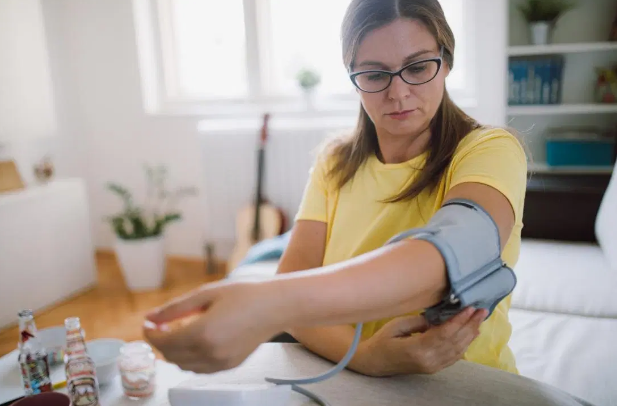Taking blood pressure pills at bedtime best for cardiovascular health
来源:中检健康
编辑:中检健康
时间:2019-10-25
New research suggests that the best time for people with hypertension to take their blood pressure pills is at bedtime rather than in the morning.

Taking blood pressure medication at bedtime is most likely to reduce cardiovascular risk, new research suggests.
It appears that not only does this timing result in better blood pressure control, but that it also markedly reduces the risk of cardiovascular death and events such as a heart attack or stroke.
Researchers came to these conclusions after analyzing data from the Hygia Chronotherapy Trial.
Hygia is the largest and longest lasting clinical trial to examine the effects of antihypertensive medication timing on the risk of cardiovascular events.
The investigators behind the present findings randomly assigned 19,084 adults to take the blood pressure pills that their doctors had prescribed either when they woke up in the morning or at bedtime. The participants were of Caucasian Spanish descent, and 8,470 were female.
During an average follow-up of 6 years, all individuals underwent 48-hour ambulatory blood pressure monitoring at least once per year.
"The results of this study," says Ramón C. Hermida, Ph.D., the leader of the Hygia project, "show that patients who routinely take their antihypertensive medication at bedtime, as opposed to when they wake up, have better-controlled blood pressure and, most importantly, a significantly decreased risk of death or illness from heart and blood vessel problems."
Hermida is a professor at the University of Vigo, in Spain, and director of its bioengineering and chronobiology labs.
He and colleagues report the recent findings in the European Heart Journal.
Markedly lower risk of cardiovascular events
The new study shows that, compared with individuals who took their blood pressure pills in the morning, those who took them before retiring to bed at night had a 45% lower risk of dying from or experiencing cardiovascular events, such as a heart attack, stroke, or heart failure.
The team adjusted the results to remove the effect of potential influencing factors. These factors include sex, age, cholesterol levels, smoking status, and presence of kidney disease or type 2 diabetes.
The researchers also examined the effect of medication timing on the risk of certain individual cardiovascular events.
These analyses showed that, compared with taking blood pressure pills in the morning, taking them at bedtime can reduce the risk of:
death due to heart or blood vessel conditions by 66%
stroke by 49%
heart attack by 44%
heart failure by 42%
coronary revascularization by 40%
Coronary revascularization is a procedure that unblocks or widens a vessel that supplies the heart to restore blood flow.
No mention of timing in current guidelines
Prof. Hermida explains that the current guidelines on how to treat high blood pressure do not mention or give advice about the best time of day to take the pills.
"Morning ingestion has been the most common recommendation by physicians, based on the misleading goal of reducing morning blood pressure levels," he observes.
However, previous findings from the Hygia project have shown that the most significant independent marker of people's cardiovascular risk is their average systolic blood pressure during sleep.
This link is independent of blood pressure readings taken during waking hours or at visits to the doctor, notes Prof. Hermida.
"Furthermore," he adds, "there are no studies showing that treating hypertension in the morning improves the reduction in the risk of cardiovascular disease."
A limitation that he and his colleagues highlight is that, because the participants came from one ethnic group, they cannot say how true the findings might be for other populations.
Origins of these benefits are unclear
Paul Leeson, Ph.D., a professor of cardiovascular medicine at the University of Oxford, in the United Kingdom, was not involved in the trial.
He commends the findings and describes the scale, length of follow-up, and effect size as "impressive."
"Where the benefit comes from remains unclear," Prof. Leeson observes.
Do these effects arise because the drugs improve sleep patterns or because side effects present less of a problem at night? he muses.
Or, could it be that overnight blood pressure is a better marker of heart health?
Prof. Leeson remarks that other studies looking into the timing of blood pressure medication are about to complete and report findings.
It will be interesting to see whether they confirm these recent results and shed any insights on the underlying mechanisms of these effects.
Published on Medical News Today
(声明:本网站部分图片、文章来源于网络,本网所有转载文章系出于传递更多信息之目的,且明确注明来源和作者,不希望被转载的媒体或个人可与我们联系,我们将及时删除)
